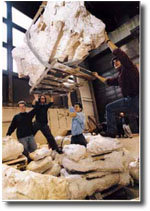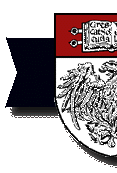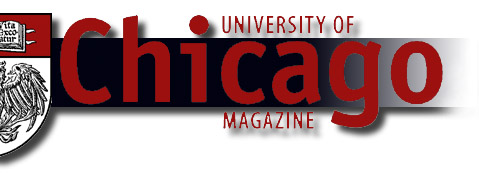|
More than ten years after the last review, the College Council
voted on March 10 to revise the undergraduate curriculum.
To be implemented in October 1999 for the Class of 2003 and beyond,
the new curriculum will divide undergraduate coursework into thirds:
the Common Core, a concentration, and free electives. Previously,
the Core made up half the coursework, with the re-mainder split
between the concentration and electives.
 |
| Twenty-five
tons of dinosaur bones arrived on campus in February,
courtesy of U of C paleontologist Paul Sereno (in light
blue shirt) and a research team that included (from left)
College student Noel Heim and graduate students Hans Larsson,
SM’96, and Jeff Wilson. Found in the Sahara Desert during
the team’s four-month 1997 expedition, the bones comprise
several skeletons, including a new species of sauropod. |
|
Dean of the College John Boyer, AM’69, PhD’75, broached a
curricular review when he took office in 1992. Beginning with
a series of retreats with faculty from the collegiate divisions,
he next organized a College-wide faculty retreat in December
1995. In January 1996, Boyer then commissioned the “Friday
Group” to study the College curriculum.
Named for its meeting day, the Friday Group consisted of
the five collegiate masters, the seven members of the Committee
of the College Council, and the eight members of the College
Curriculum Committee. The group met throughout the 1996–97
academic year, holding Q & A sessions and hearing presentations
from faculty leaders in Core instruction.
|
In spring 1997, a drafting committee prepared a curriculum proposal
that was modified by the Friday Group and then introduced to the
40-member College Council in June 1997. Early this year, the council
debated the proposal in six meetings, then approved the revised
curriculum by a 3-to-1 vote. At the same time, the council called
for another review of the curriculum no later than 2002.
Boyer compares the new cur-riculum to another “new” set of courses—the
New Plan of the 1930s, which required undergraduates to take 15
quarters of general education in their first two years in the College.
This was accomplished through five yearlong survey courses, representing
each of the four divisions and a course in writing. The second two
years were devoted to more specialized study.
The undergraduate curriculum has changed frequently over the intervening
decades. In what was known as the Hutchins College of the 1940s,
it focused almost exclusively on general education. President Hutchins’s
successor, Lawrence Kimpton, ushered in a two-plus-two structure,
calling for half of students’ education to be de-voted to general-education
courses, with the rest divided between a concentration and electives.
The general-education portion of the curriculum was not termed
the Common Core until 1966–67. While its name has stayed the same
for 30 years, its content has varied. At times, it consisted of
only prescribed courses and at other times of a combination of prescribed
courses and a “menu” of options. Often, the Core has taken many
students more than two years to complete.
Designed to allow students to complete their common studies in
the first two years and to spend the next two on advanced work in
concentrations and electives, the new Core will consist of six quarters
of natural and mathematical sciences, six quarters in the humanities
and civilizations, three quarters of social sciences, and—rather
than required coursework—demonstrated competency in a foreign language.
Students will divide the balance of their courses—a total of 42
are required for graduation—between concentrations and free electives.
The number of concentration courses will hold at current levels,
while the number of elective opportunities will increase.
“The new curriculum is the outgrowth of an exhaustive process,”
says Boyer. “The faculty are passionately committed to providing
the best possible liberal education for our students, which is why
they have spent three years thinking about the vital issues that
informed the construction of this new curriculum.
“The Chicago Plan—which is what I personally hope our new curriculum
will come to be called—introduces students to several broad domains
of knowledge while explicitly focusing on the intellectual habits
of inquiry, analysis, and writing.”
Boyer sees several advantages to the new curriculum, especially
that it continues to offer “a rigorous program of general education,”
but concentrates the Core classes in the first two years, helping
students to make the transition between high school and higher learning.
Currently, many students don’t finish the Core requirements until
the third or fourth year.
“[That] makes no pedagogical sense,” notes Bert Cohler, AB’61,
the William Rainey Harper professor in the College and the spokesperson
of the Committee of the College Council. “Juniors and seniors should
be doing advanced work. There are few other places in the country
where they have the opportunity to hunt for dino-saur bones one
week and visit a clinic for chronically mentally ill patients the
next.”
Boyer adds that the general-education courses will become more
interdisciplinary, integrating work in the humanities and social
sciences as well as in the biological and physical sciences. And
in another echo of the New Plan of the ’30s, “resources devoted
to the development of student writing will double,” Boyer points
out.
Students will also have more electives with which to explore on
an advanced level interests stimulated by their Core courses. “To
the extent that the new curriculum allows many students to move
more quickly to higher levels of learning, it should result in a
more challenging educational experience,” he says. “We believe that
allowing our students more opportunity to play to their considerable
strengths will strengthen the College.”
In addition, Boyer says, students will also be able to use some
of their elective courses for advanced foreign-language learning
and foreign-study opportunities, as well as advanced courses in
writing. For example, the College has be-gun a global-learning initiative
and a foreign-language-proficiency certificate program. The College
will also increase support for the Little Red Schoolhouse and add
advanced courses in creative and expository writing.
Boyer is enthusiastic about the new Chicago plan: “The dedication
of our faculty to designing and teaching imaginative general-education
courses and superior concentration programs lies at the very heart
of the University’s traditions, and such dedication will continue
to define the work of the College in the coming century.”—K.S.
|



